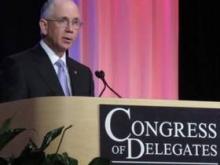PHILADELPHIA – The American Academy of Family Physicians opened its Congress of Delegates meeting here with a vow to press forward with efforts to have government and private payers reimburse the specialty at a higher rate.
At a Town Hall forum on the evening of Oct. 14 and the first general session on Oct. 15, the academy’s leadership said that it would continue to fight for a higher valuation for family medicine through its representation on the American Medical Association’s Relative Value Scale Update Committee (RUC). In the fall of 2011, the AAFP threatened to pull out of the RUC if the payment concerns of family physicians were not addressed.
In March, however, the academy said it would consider alternate ways to support a revaluation of family medicine.
Many AAFP members have not been happy with that approach and have floated several resolutions to keep hammering at the issue. Among them: a resolution to create a set of family medicine–specific codes. Testimony at the AAFP’s Reference Committee on Practice Enhancement seemed to lean largely against that proposal, but there was consensus that family medicine is consistently undervalued.
"This congress is very familiar with family medicine’s frustration with the RUC," AAFP President Glen Stream said at the meeting. He noted, however, that for the moment, "remaining in the RUC allows the opportunity to advocate and press for [the] changes."
The full congress will probably take up the RUC-related resolutions and put them to a vote on Oct. 16 or Oct. 17.
The same committee also heard cautionary testimony on a resolution that would make it AAFP policy to oppose telemedicine that is provided in the absence of a pre-existing physician-patient relationship. The resolution emerged from concerns about the rise of for-profit entities – such as pharmacy chains – that bypass physicians in the community.
Impassioned and lengthy testimony at the Reference Committee on Advocacy addressed two resolutions seeking the AAFP’s backing of same-sex civil marriage. An overwhelming number of speakers said that such marriages would help improve public and individual health. More than a handful gave personal anecdotes about their own same-sex relationships, but several of the opposing delegates said that they would leave AAFP if gave its support to the resolution.
The advocacy committee also heard pro and con on a resolution to back over-the-counter emergency contraception for all women of childbearing age.
Finally, the AAFP leadership said that the board had given approval to generate a new report on what family medicine should look like going forward. The AAFP developed just such a blueprint 8 years ago, but the research that supported that paper has become dated, said Dr. Douglas Henley, AAFP executive vice president.
"Now is a critical time to begin a discussion and perhaps revisit research or even initiate new research about what comprehensive primary care means in 2012 and into the future," Dr. Henley said.
The process has begun, he noted, adding that AAFP members should expect to hear more in January.


